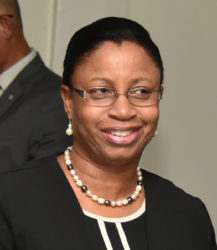Following months of no sittings because of vacancies on the bench, the Appellate Court could soon resume work as this morning, Acting Chief Justice Roxane George SC and Justice Dawn Gregory are scheduled to be sworn in by President David Granger.
The Ministry of the Presidency last evening issued an advisory informing of the swearing in but did not state who the judges are.
However, sources told Stabroek News that it was Justices George and Gregory who would be sworn in.

Five judges make up Guyana’s Appeal Court. The Chief Justice, by virtue of office is a member, the Chancellor of the Judiciary is the President and the three other judges are appointed based on recommendations by the Judicial Service Commission.
In urgent matters, where there are only two confirmed justices, at least three judges could hear appeals from the bench.
As it stands, the court only has one permanent appellate judge in acting Chancellor Yonette Cummings-Edwards.
The urgent need for appellate judges was previously highlighted. In February, former Attorney General Anil Nandlall had said the Appeal Court could not sit due to the retirement of acting Chancellor Carl Singh and Justice BS Roy, which left the court without the minimum complement of judges needed to hear matters.
Earlier this month Stabroek News reported that members of the JSC had met and interviewed Justices George and Gregory to fill the appellate court vacancies.
More than a year ago, the previously constituted JSC, chaired by the now retired Chancellor (Ag) Carl Singh, had submitted a list of four names to Granger recommending two attorneys for the High Court and two High Court Judges for the Appeal Court. The high court justices named were Justices Gregory and Rishi Persaud while State Solicitor/Public Trust Damone Younge and attorney Sandil Kissoon were recommended for puisne judges.

However, Granger never acted on the list but said he had asked the acting Chancellor to advise him in relation to the vacancies. Some legal observers have said that the acting Chancellor could not present a list to supersede former Chancellor Singh’s.
Sources yesterday also said that attorney Simone Morris-Ramlall has been chosen as a puisne judge.
Stabroek News understands that Ramlall and the other puisne judges will be sworn in later this month. That is because some of them have cases to complete before they could take up their respective posts.
When Justice Cummings-Edwards took the oath of office in April of this year, she told reporters that addressing the shortage of judges was key on her agenda and that a meeting of the JSC would be convened shortly.
The President at Justice Cummings-Edwards’ swearing in had acknowledged that there was a shortage of judges and assured that efforts were being made to rectify the situation as soon as possible.
He then also pointed out that he had received some names for appointments from the JSC but had withheld approval pending the review and advice of the new Chancellor. “I withheld approval because I sent the recommendations to the present Chancellor, who has agreed to look at them and resubmit a list to me. As soon as I get that list, I will be able to act. So, I did decline. I saw the list, and I received some information, and on the [basis] of that information, I sent it to the present Chancellor and I am awaiting her advice,” Granger said.
He further noted, “There is a shortage and we are moving quickly with the Chancellor and the Chief Justice, who have been installed, to have the Court of Appeal constituted; to have the Judicial Service Commission meet to make recommendations and fill the vacancies as soon as possible.
The opposition People’s Progressive Party has bemoaned the state of affairs in the Appellate Court.
“The impact that this nonfunctional court is having on the justice system, the backlog of cases and the constitutional rights of litigants to have a court ready and able to hear their legal grievances is catastrophic,” former Attorney General Nandlall had said. He had added that this situation can affect lawyers’ ability to file matters in the Caribbean Court of Justice (CCJ) as leave has to be first granted by the Court of Appeal.
Granger when asked about the concerns had said: “I am confident that the new Chancellor is aware of the shortages and as quickly as the JSC could meet and submit to me, I would move ahead. I have no interest in perpetuating a situation in where there are insufficient judges. The backlog is being built up and the swearing in of the Chancellor and Chief Justice is a step in the right direction.
“So I expect that as soon as the JSC makes its recommendations I will be able to give approval and move ahead. I think the crisis… will resolve itself in a few days or weeks,” he added.





